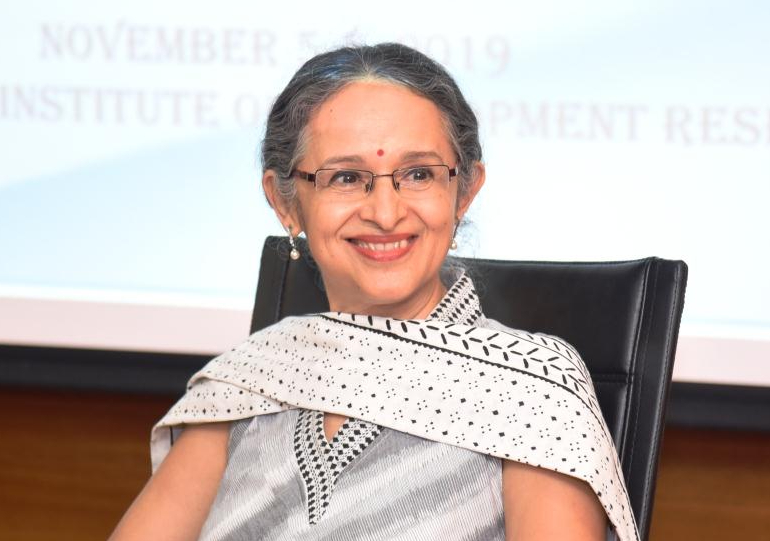Great Opportunity to kick-off virtuous Growth Cycle says Prof Ashima Goyal, Member of Monetary Policy Committee, RBI at RSFE 2022
The concluding day of the IFMR GSB Research Symposium on Finance and Economics (RSFE) 2022, saw lectures on opportunities and risks in Decentralized Finance, elaboration of improvement of girls’ education through experimental and non-experimental evidence and exploring the outperformance of the Indian financial sector in a world still reeling from the effects of the pandemic. The day had three keynote lectures, three technical sessions and twenty-six paper presentations from academics spanning forty-one universities across eleven countries.
During her keynote address at RSFE 2022, Prof Ashima Goyal, Member of Monetary Policy Committee, Reserve Bank of India and Emeritus Professor at IGIDR, India said that India has been going through a very tough time and there were all kinds of preconceptions and predictions that the Indian financial sector is fragile, cannot recover without major reforms, there exists a trust deficit, PSBs are the problem and privatization is the only answer; but the financial sector has really surprised everyone by outperforming during this period.
Stating that the sector has always been underestimated, Prof Ashima said that during the previous year when overall credit growth was at single digits at 6.9%, for the small and medium industry, it has grown to 48.6%, for the consumer durables industry it has grown to 44% and retail and SME sector has seen credit growth of 11%, this year. In May 2022, Bank credit growth at 12% reached double digit for the first time since 2018 – 19.
According to Prof Ashima, the Indian financial sector’s delivery has been underestimated because of rising diversity in the sector. The expectations were that PSBs are fragile and GNPAs was expected to rise. Whereas the share of non-banking financing rose to 70.5% during 2020-21 from 47.7% in 2019-20 and bank lending rose to 56.6% and remained higher than the pre-pandemic level during 2021-22. The Indian banks GNPAs has come down to 9.54% which is way lower than RBI estimate of 15.6%.
Prof Ashima also said, “This has been possible due to adequate reforms from time to time, for instance Institutional improvements like tightening of corporate governance, IBC and CVC activism, regulatory improvements like KYC, disclosure and suitability, SEBI reforms, Company Act revisions, distinction between commercial and criminal activities, PCA Act revision and a host of banking reforms has contributed to the out performance of the Indian financial sector during this period.”
“India has the largest share of youth and combined with technology, innovation and inherent resilience there is great opportunity to kick-off a virtuous growth cycle, with inclusion largely from empowerment” she added.
Ending with a word of caution, she said though the sector performed beyond expectations there were still lots of risks and uncertainties that one should be careful of. Excessive stimulus or tightening can prove countercyclical for the Indian financial sector.
Prof Campbell R. Harvey, J. Paul Sticht Professor of International Business and Professor of Finance, Fuqua School of Business, Duke University, United States, delivered his Keynote Lecture in the morning, on “DeFi: Opportunities and Risks”. In DeFi or Decentralised Finance, users interact as peers with algorithms or smart contracts rather than through traditional intermediaries such as banks, brokerages, or insurance companies. “DeFi is the future of financial transactions”, said Prof Harvey.
“It is not far-fetched to think that many of our financial transactions will be made through algorithms. DeFi will replace all meaningful centralised infrastructure in the future.” He discussed the types of problems DeFi or Decentralised Finance attempts to solve, such as inefficiency, limited access, opacity, centralised control and lack of interoperability. He also detailed some of the key opportunities as well as the most important risks, including environmental. As Prof Harvey pointed out, “Bitcoin alone uses the amount of energy that Argentina uses; this is environmentally reckless.”
Through DeFi, money has been redefined. “Decentralized Finance is not a renovation, but a rebuild of the financial infrastructure from the bottom up. We are now seeing the scaffolding of a new city that reinvents finance. DeFi is a technology of financial democracy, inclusion, equality and equal opportunity to succeed; all of this is good for economic growth,” concluded Prof Harvey.
Prof Nishith Prakash, Associate Professor of Economics, University of Connecticut, United States, delivered the last keynote address for the day on “Improving Girls’ Education: Evidence from Two Countries”. He shed light on how despite considerable progress in closing the gender gap in education, there still exist several barriers to human capital accumulation for girls in developing countries, such as distance to school, safety and violence, lack of agency and socio-cultural barriers. In this talk, Prof Prakash provided both experimental and non-experimental evidence from India and Zambia. He added, “Evidence suggests that compared to several expensive ways to address school access for adolescent girls, reduction in ‘distance cost’ could be a credible short-medium run solution, especially in contexts where other inputs are scarce.”
RSFE 2022 concluded with the ‘Best Paper Awards’ in the areas of Finance and Economics being presented. The awards were sponsored by CFA Institute and IFMR GSB.


